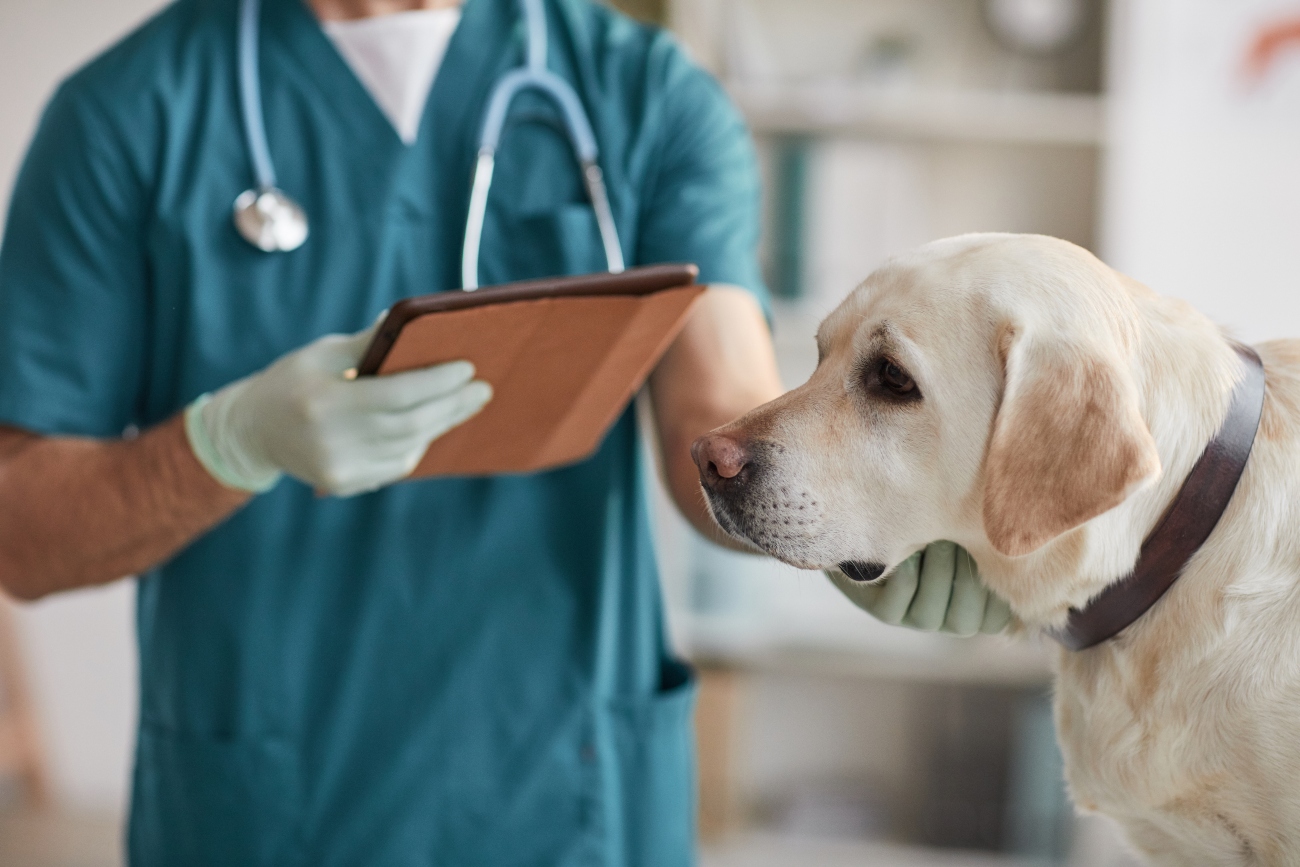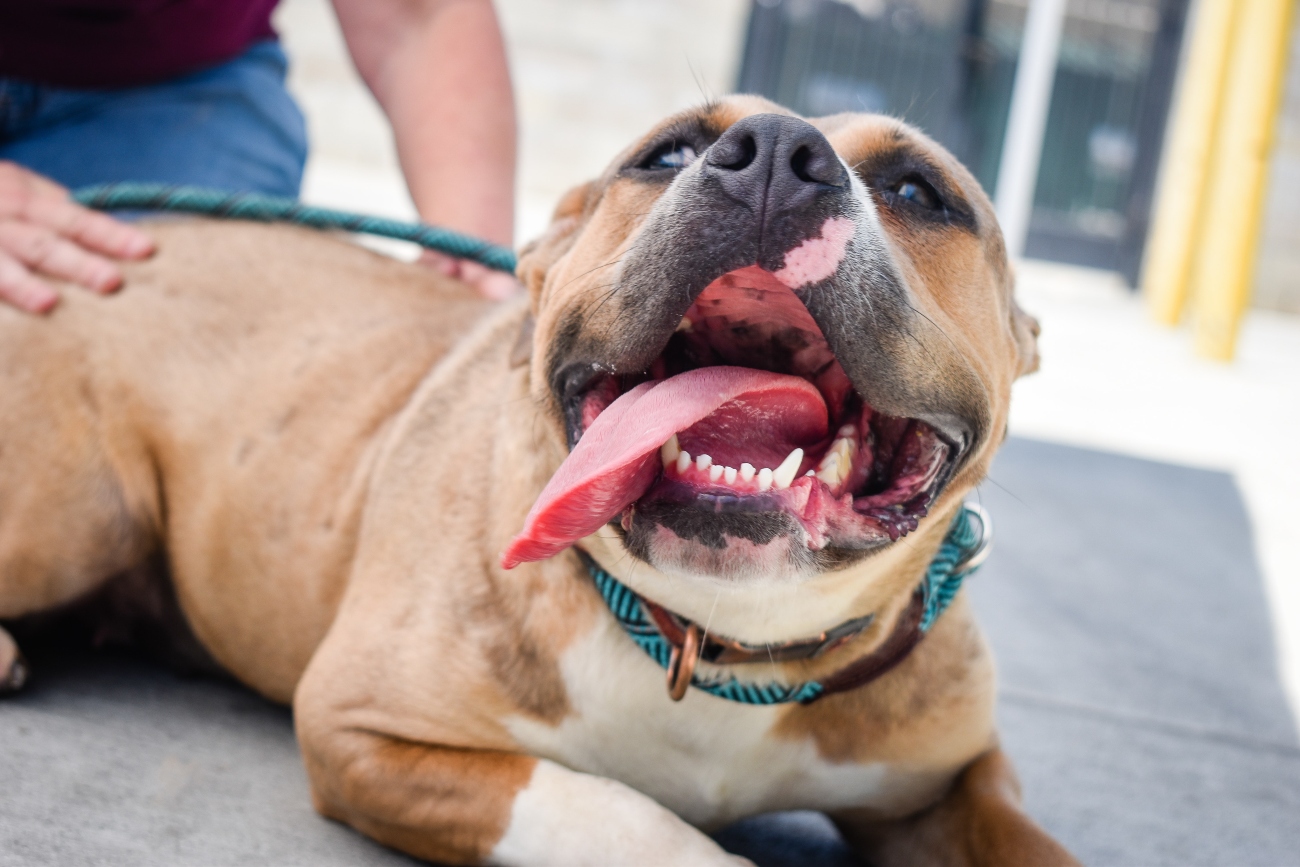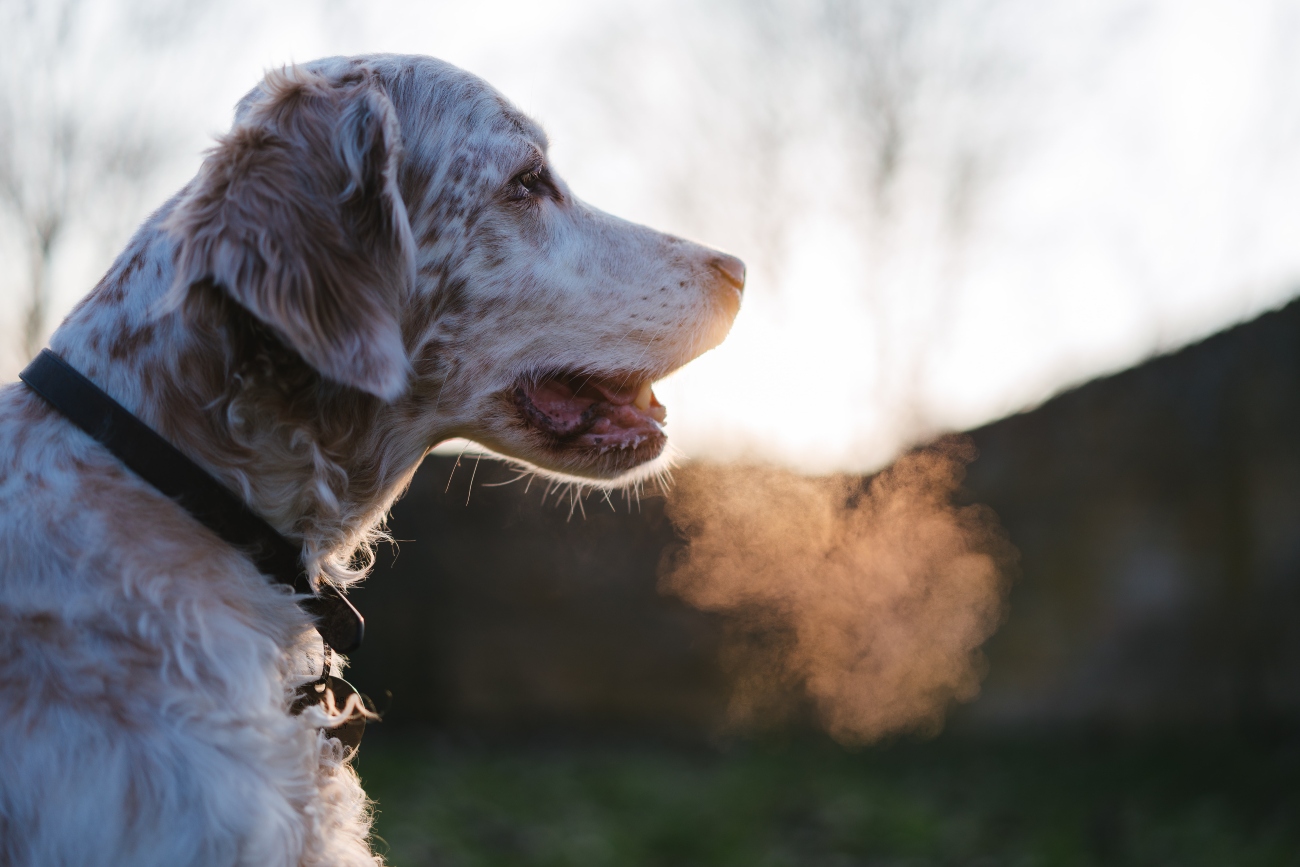
10 reasons to take your senior dog for a check-up
27th January, 2022
As your beloved dog moves into old age, you'll naturally start to become a little more vigilant for the telltale signs of any health conditions. And indeed, some of these – such as arthritis, cancer, and certain cognitive dysfunctions – are more likely to afflict your dog in their later years.
For that reason, regular vet check-ups become increasingly advisable at this time. Other consultations and treatments may also be recommended, according to your dog's particular needs. This increased need for vet visits and possible treatments makes senior dog insurance especially recommendable during these years.
If your dog is displaying any one of the 10 symptoms or behaviours below, don’t delay in booking a check-up today.

-
Lack of energy
As your dog gets older, it's natural that their energy levels will tail off a little bit. You’re likely to find that they may not have quite the same appetite for those long walks they used to love, preferring a slightly shorter route; and those agility-based games that you love to play together may need to be adjusted slightly. However, even older dogs still retain an appetite for exercise and an inherent curiosity about the outside world. We gave you some top tips for walking older dogs elsewhere on the site, by the way.
If your older dog starts to show markedly less interest in playing the games they've always loved, it may be time to get them seen by a vet. Similarly, if they are sleeping more during the day, and seem to be awake more at night, you should get a professional opinion. The reason is that either or both of these behaviours may indicate the onset of cognitive dysfunction syndrome (CDS), which can affect roughly half of dogs over the age of 11.
In fact, although your dog's lethargy may be a sign of CDS, it may be down to something else altogether. If you do notice that your furry companion isn't their usual happy-go-lucky self, it's possible they could have some other condition – an infection, for example. Whatever the cause might be, your first step should be a visit to the vet.
-
Confusion, disorientation, whining or barking
The cognitive dysfunction syndrome we mentioned above can also bring some other symptoms with it. Your dog may seem confused around the house or on their favourite walks. They might appear disorientated in places which should be familiar to them. Perhaps they are whining or barking much more than they would normally, and seem tense and anxious in situations where they'd usually be happy and at ease?
In fact, these behaviours can be warning signs for other conditions too, so either way you should definitely get them checked out. Unfortunately, there is no cure for cognitive dysfunction, but you can help minimise the loss of brain activity with the use of certain medications. There is also a range of antioxidant-enriched foods on the market: antioxidants have been shown to boost cognitive function.
Other behaviour changes may simply indicate that your pet is in pain – for example, a previously placid and amenable dog may suddenly seem to be snapping or biting a lot. This kind of pain could be produced by various conditions including arthritis. Once again, get a vet to take a look.
If you have some older dog insurance in place, the costs of any treatment or medication should be covered. It may also cover things like special diets. Ask the team at Petwise for more information when you get a quote.
-
Weight loss
Minor weight loss is another change that goes hand in hand with ageing in dogs. A slow, moderate and regularly paced pattern of weight loss is to be expected as they grow older: this is down to a mix of factors including like reduced appetite, digestive problems and loss of muscle mass. All of these are common developments in older canines, and shouldn't cause you to worry.
However, if your dog seems to be losing weight suddenly and/or in large amounts, yet is still eating normally, you should book an appointment with your vet to find out what's going on. For example, this could be a sign of hyperthyroidism (an overactive thyroid gland), although this is more likely to be seen in cats than in dogs.
Your dog's rapid weight loss might have other causes, including a parasite or disease to the kidney or liver. It might be an infection, which can be treated quickly and easily. Whatever the cause, a quick diagnosis will give your dog the best outcome. Read more about rapid weight loss in older dogs in our recent blog.
-
Bumps on the skin
It's not all that uncommon for dogs to have miscellaneous lumps and bumps on their body, and many are harmless. However, these growths can have a number of causes, some more serious than others – so again, the best course of action is to book in a vet appointment as soon as you can.
Less serious causes include an infection or a cyst (a lump under the skin caused by build-up of fluid). On the more serious side, the bump(s) could indicate a lymphoma. As with many of these health problems, early detection is vital to giving your pet the best chances of making a full recovery.
If you see any lumps on bumps on your dog's skin that you hadn't noticed before, get them checked out as soon as possible. As the Kennel Club explains, your vet might need to take a biopsy to properly diagnose the lump, or there may be x-rays or further lab tests needed. Depending on the underlying condition, treatment may be simple or more complicated. Whatever the outlook, some senior dog cover will stand you in good stead and cover the costs of expensive procedures.

-
Reduced or increased appetite
You will know your dog's appetite pretty well by now. You will also know that, as they enter old age, this is likely to lessen a little – partly because they're less active, partly because their digestion may not be quite what it once was.
However, as with weight loss above, this loss of appetite will normally be a steady, gradual process. If, conversely, your dog's hunger seems to suddenly or dramatically decrease, there could be other factors at work. It can often be down to something as simple and adjustable as a change in their environment which is causing them stress – a new and invasive noise in the neighbourhood, for example, or building work in the home, or a new member of the household.
However, there can be other factors behind reduced appetite in dogs. For instance, it can be caused by glaucoma (a build-up of pressure in the eye), by kidney disease, or by a blockage in the intestinal tract or throat.
At the other end of the scale, you may find your senior dog's appetite suddenly grows, and they are constantly hungry. In this case, causes could include Cushing’s disease, in which animals over-produce the hormone cortisol. The consequences of failing to treat this can be serious, as it leaves your dog more open to a range of infections.
Any cases of sudden change of appetite should be looked at by your vet. Petwise policyholders can also call the dedicated 24-Hour Vet Helpline for advice if they’re worried.
-
Vision or hearing loss
In senior dogs, a certain level of hearing loss is to be expected, and old age can bring with it some sight loss as well. However – as with so many of these conditions – if the problem seems to develop suddenly, there's probably something more than just the ageing process at work.
For example, older dogs are more prone to developing cataracts – a cloudy layer that forms over the eye, and which can result in partial or total blindness. Surgery to remove cataracts is a relatively routine operation. It can be expensive, though, so make sure you have some senior dog insurance in place to help with the costs.
-
Vomiting or diarrhoea
Both of these problems can be unpleasant for your dog to experience – not to mention for you, cleaning up afterwards. And, what's more, vomiting or diarrhoea – often collectively referred to under the heading of 'gastrointestinal issues' can indicate underlying problems such as kidney disease.
Then, on the other hand, it could be down to something as innocent as a bout of food poisoning.
The rule of thumb here is that if the vomiting or diarrhoea doesn't clear up quickly (within a few days), you should seek medical attention.
In a related scenario, older dogs can often have urinary accidents, because the muscles controlling the bladder start to get weaker as they age. Similarly, though, this could denote something else, such as a urinary tract infection. If these accidents are occurring because they seem to be forgetting to go to the toilet in their usual place, it could be an early sign of dementia. If it seems to be happening regularly, therefore, seek help.
-
Thirst
Are you noticing that your dog is drinking a lot more? And can this new thirstiness not be explained away by a spell of warmer weather, or by turning the heating on? If not, it's probably worth getting it looked at.
Dogs that seem to be thirstier than usual may be showing signs of Cushing's disease, which we mentioned above. If this condition isn't treated quickly, it can lead to other health issues – among them, an increased risk of infections. The good news is that, if a diagnosis is made promptly, Cushing's disease can usually be managed effectively with medication.
-
Doggy breath
Bad breath in your senior dog may indicate gum disease. But how serious is a bit of gum disease, really? Well, for one thing it will be quite painful to your dog, and will cause them some distress.
More seriously, though, it can result in tooth loss. In fact, if left unchecked, the bacteria at work in gum disease can enter the bloodstream, which puts other organs at risk.
Read more about bad breath in dogs in our recent article on the subject. And if your dog's breath seems a little off-colour, get it checked out sooner rather than later.

-
Movement difficulties
Of course your senior dog is not going to be quite as light on their feet as they were when younger, and their movements are likely to become a little more laboured with age. You'll find yourself allowing a little more time for the various activities in their life, from walkies to bathtime.
However, if their movements seem unusually effortful, and if certain manoeuvres are actively causing them pain, this may be a sign that arthritis is developing. Yes, the condition affects dogs as well as humans – in fact, we've noted elsewhere on our blog that Labradors seem particularly susceptible.
Once again, the best procedure here is to book in a visit to your vet, to confirm the diagnosis and to put together a treatment plan. Like cognitive dysfunction, arthritis unfortunately cannot be cured. However, there are a few things you can do, both in terms of medication and lifestyle changes, to make your dog's life as comfortable as possible.
For example, your vet may prescribe some anti-inflammatory medication, to decrease the inflammation and subsequent pain. They may also recommend certain dietary supplements that can help mitigate some of the effects of arthritis.
Helping your four-legged friend through old age
Keeping on top of health advice like this is the best way to ensure that your furry friend's senior years are as happy, healthy and vigorous as possible. Another great way to look after your dog in their later years is to take out some dedicated senior dog insurance.
Our pet insurance for older dogs is available in no fewer than seven levels of cover. Benefits include a 24-Hour Vet Helpline, a senior food contribution, and dental cover as standard.
Better still, there's no upper age joining limit, so you can sign your companion up at any time.
Contact us to get a quote today.